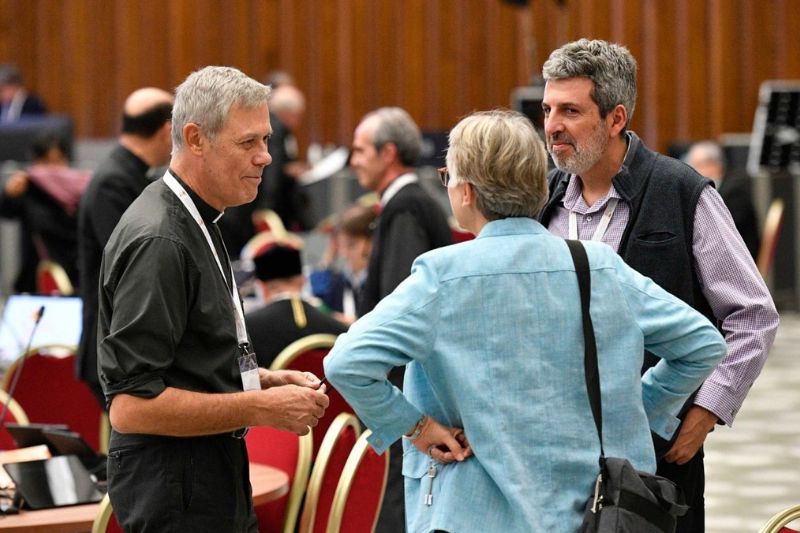Many Catholics are now torn between hope and regret. There has been a flood of commentary and reportage since the First Session of the Synod on Synodality closed at the end of October. Within this torrent, opinions have been mixed as to the outcomes so far and likely future directions. Both at the international and national level, inside and outside, there has been little consistency in the messages. Furthermore, as the Synod was a closed event those of us on the outside have little to go on other than the formal reports and the interpretations of those either inside the synod or close by in Rome.

Public statements by Pope Francis haven’t helped much either. While he confronted dissenting conservative Cardinals and helpfully urged that the Church to become less ‘masculine’ (but not gender equal), he has also upbraided the German Church once again for its commitment to co-responsible governance reforms through its Synodal Way. His overall direction remains difficult to read and his future path hard to predict.
This confused situation has not been helped by the fact that within the Church, bar the toxic right-wing, we mostly tend to be overly diplomatic and polite in our language. Sometimes synodality sets out to encourage it. In this environment more ‘plain speaking’ and fewer riddles would be welcome.
Many international observers trusted by the reform movement, like Austin Ivereigh, Massimo Faggioli, and Christopher Lamb, have been upbeat about the direction that the Synod is leading the Church. Ivereigh has concluded that ‘synodality works’. Faggioli has argued that we are still a Vatican Two Church, despite slow progress. Lamb believes that the Synod Synthesis document ‘points towards a profound shaking up of the Church’ and a ‘foundation stone for a deep reform’. The same tone was true of the reports from Rome of Marist Brother Mark O’Connor, Director of Communications from the Parramatta Diocese.
Not so reformers within the Spirit Unbounded Movement. The public letter to Pope Francis signed after the Synod by Mary McAleese, Cherie Blair and others was scathing about lack of progress on issues like gender equality. It concluded that ‘prophetic voices won no significant concessions from powerful and wealthy forces of conservatism’. Prof McAleese provocatively describes the Synthesis report as like ‘the minutes of an unresolved quarrel.’
When official Australian participants, like Susan Pascoe, Bishop Shane Mackinlay and Archbishop Anthony Fisher reported back their conclusions also differed in tone between encouraging and critical, as noted by Fr Frank Brennan in a recent homily. The same was true of Australian contributions within the synod, like Fr Ormond Rush, Prof Renee Kohler-Ryan, and Archbishop Fisher himself, as far as can be judged by their public contributions. The Australian Church is just as divided as the international Church.
The disappointing likelihood is that, despite the hype and optimism in certain circles, not much will change in most parts of the Church. Some hope that the new synodal process of being church will hold sway and ultimately produce co-responsibility, equality, and inclusion within the Church. They find some comfort in the frequently repeated aphorism (contested by Bishop Mackinlay) that the progressives won the process while the conservatives won the content at the Synod.
'A brighter future for the Church probably lies not with wholesale reform, but only with certain progressive dioceses, parishes, religious congregations, and ecclesial communities which see the light.'
But even the synodal process itself remains under threat from those like Archbishop Fisher who openly decry the methodology. In doing so he is implicitly critical of our own Australian Plenary Council, much praised in Rome as a precursor of the Synod, when he concludes that a new method is needed for the Second Assembly and that spiritual conversations will not do the job. If this happens, reformers will have been sold a pup when unswerving adherence to spiritual conversations has been demanded of us. Archbishop Fisher warns against synodality being used as ‘a weapon for forcing change of Church teaching or order.’
The drift away from the Church will continue. Many more will continue to walk away if this new synodal process of listening and consultation fails to become embedded. The recent brief report from the bishops on November 26 entitled ‘Reflecting on the Fifth Plenary Council of Australia’ shows how little can be expected in this regard from most of the motley crew which make up Australia’s dioceses. A brighter future for the Church probably lies not with wholesale reform, but only with certain progressive dioceses, parishes, religious congregations, and ecclesial communities which see the light.
During the interregnum to the Second Assembly of the Synod next October much greater clarity of communication is needed from Church authorities. The public meeting initiated by the Sense of the Faithful group at Newman College, at which Mackinlay and O’Connor spoke, was a rare example of trying to bring the wider community into the loop. Holding Catholics in suspense and keeping them as outsiders to the Synod process can do no good.
John Warhurst is an Emeritus Professor of Political Science at the Australian National University.
Main image: (Vatican Media)